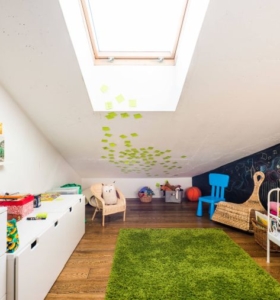Los bebés y los mitos sobre su sueño en los que no debemos creer
Los bebés y los mitos sobre su sueño en los que no debemos creer
Desde tiempos ancestrales, los bebés han sido objeto de numerosos mitos y creencias populares en relación a su sueño. Estos mitos, aunque arraigados en la cultura, no están respaldados por la evidencia científica y pueden llevar a malentendidos y a prácticas inadecuadas por parte de los padres. Es importante desacreditar estas falsas creencias y proporcionar información basada en la investigación para fomentar un sueño saludable y seguro en los bebés.
Uno de los mitos más comunes es que los bebés deben dormir toda la noche desde temprana edad. Sin embargo, la realidad es que la mayoría de los bebés se despiertan durante la noche, ya sea para alimentarse, cambiar su pañal o simplemente por necesidad de contacto y consuelo de sus padres. El sueño de los bebés es diferente al de los adultos, y despertarse durante la noche es una parte normal de su desarrollo.
Otro mito es que los bebés deben dormir solos en su propia habitación desde el primer día. La realidad es que los bebés necesitan de la cercanía y el contacto con sus padres para sentirse seguros y protegidos. Dormir cerca de ellos, ya sea en la misma habitación o en una cuna adyacente, ha demostrado ser beneficioso para su desarrollo emocional y físico. Además, tener a los padres cerca facilitará la tarea de atender sus necesidades durante la noche.
Un mito que genera preocupación en muchos padres es que los bebés que duermen boca abajo son menos propensos a sufrir el síndrome de muerte súbita del lactante (SMSL). Sin embargo, la evidencia científica demuestra lo contrario. Los bebés que duermen boca arriba tienen un menor riesgo de SMSL, por lo que es fundamental colocarlos en esta posición para dormir. Es importante ofrecer un ambiente seguro para su sueño, evitando almohadas, exceso de mantas y objetos sueltos en la cuna.
Algunos creen erróneamente que si dejan llorar a sus bebés durante la noche, aprenderán a dormir mejor. Sin embargo, dejar llorar a un bebé puede generar estrés, ansiedad y afectar su vínculo emocional con sus padres. Los bebés necesitan de su cuidado y atención durante toda la noche. Responder a sus necesidades y brindarles consuelo y calma promoverá un sueño más tranquilo y reparador.
En resumen, es fundamental desacreditar los mitos sobre el sueño de los bebés y basar nuestras prácticas en la evidencia científica. Los bebés tienen necesidades únicas y es responsabilidad de los padres proporcionarles un entorno seguro y tranquilo para su descanso. Dormir cerca de ellos, colocarlos boca arriba y atender a sus necesidades durante la noche son acciones fundamentales para promover un sueño saludable. ¡No caigamos en los mitos y brindemos el mejor cuidado a nuestros pequeños desde el momento en que cierran sus ojitos! Para fomentar un sueño saludable en los bebés, debemos desacreditar los mitos sobre su sueño y basar nuestras prácticas en la evidencia científica. Algunos de los mitos comunes que no debemos creer son:
1. Los bebés deben dormir toda la noche desde temprana edad: En realidad, es normal que los bebés se despierten durante la noche para satisfacer sus necesidades de alimentación, cambio de pañales y contacto con sus padres.
2. Los bebés deben dormir solos en su propia habitación desde el primer día: Los bebés necesitan la cercanía y el contacto con sus padres para sentirse seguros y protegidos. Dormir cerca de ellos ha demostrado ser beneficioso para su desarrollo emocional y físico.
3. Los bebés que duermen boca abajo tienen menos riesgo de SMSL: La evidencia científica demuestra lo contrario, los bebés que duermen boca arriba tienen un menor riesgo de síndrome de muerte súbita del lactante. Es importante colocar a los bebés en esta posición para dormir y ofrecer un ambiente seguro.
4. Dejar llorar a los bebés durante la noche les enseñará a dormir mejor: En realidad, dejar llorar a un bebé puede generar estrés, ansiedad y afectar su vínculo emocional con sus padres. Los bebés necesitan cuidado y atención durante toda la noche para promover un sueño tranquilo y reparador.
En resumen, es importante proporcionar un entorno seguro y tranquilo para el sueño de los bebés, basado en la evidencia científica. Dormir cerca de ellos, colocarlos boca arriba y atender sus necesidades durante la noche son prácticas fundamentales para promover un sueño saludable. Debemos evitar caer en los mitos y brindar el mejor cuidado a nuestros pequeños desde que cierran sus ojos. En resumen, debemos evitar caer en los mitos sobre el sueño de los bebés y proporcionarles un entorno seguro y tranquilo para su descanso. Los bebés tienen necesidades únicas y es responsabilidad de los padres atender sus necesidades durante la noche. No debemos creer que los bebés deben dormir toda la noche desde temprana edad, que deben dormir solos en su propia habitación, que los bebés que duermen boca abajo tienen menos riesgo de SMSL o que dejar llorar a los bebés durante la noche les enseñará a dormir mejor. En cambio, es fundamental dormir cerca de ellos, colocarlos boca arriba y responder a sus necesidades para promover un sueño saludable. Además, debemos brindarles consuelo y calma durante la noche, evitando dejarlos llorar. Los mitos sobre el sueño de los bebés pueden generar malentendidos y prácticas inadecuadas por parte de los padres. Es importante desacreditar estos mitos y proporcionar información basada en la investigación para fomentar un sueño saludable y seguro en los bebés. Además, es crucial recordar que cada bebé es único y puede tener patrones de sueño diferentes. Lo que funciona para un bebé puede no funcionar para otro, por lo que es importante estar abierto a adaptar las rutinas y prácticas de sueño según las necesidades individuales de cada bebé.
En resumen, es esencial desacreditar los mitos sobre el sueño de los bebés y basar nuestras prácticas en la evidencia científica. Los bebés tienen necesidades únicas y es responsabilidad de los padres proporcionarles un entorno seguro y tranquilo para su descanso. Dormir cerca de ellos, colocarlos boca arriba y atender a sus necesidades durante la noche son prácticas fundamentales para promover un sueño saludable. Evitemos caer en los mitos y brindemos el mejor cuidado a nuestros pequeños desde el momento en que cierran sus ojos. En conclusión, es importante desacreditar los mitos sobre el sueño de los bebés y basar nuestras prácticas en la evidencia científica. Los bebés tienen necesidades únicas y es responsabilidad de los padres proporcionarles un entorno seguro y tranquilo para su descanso. Dormir cerca de ellos, colocarlos boca arriba y atender a sus necesidades durante la noche son acciones fundamentales para promover un sueño saludable. No debemos caer en los mitos y brindar el mejor cuidado a nuestros pequeños desde el momento en que cierran sus ojos.

When it comes to sleep, new parents are bombarded with advice from all directions. Your mother, your best friend, even the girl at the store is more than willing to offer you tips on sleep training. So how do you sift through all the conflicting advice and make the best decision for your family?
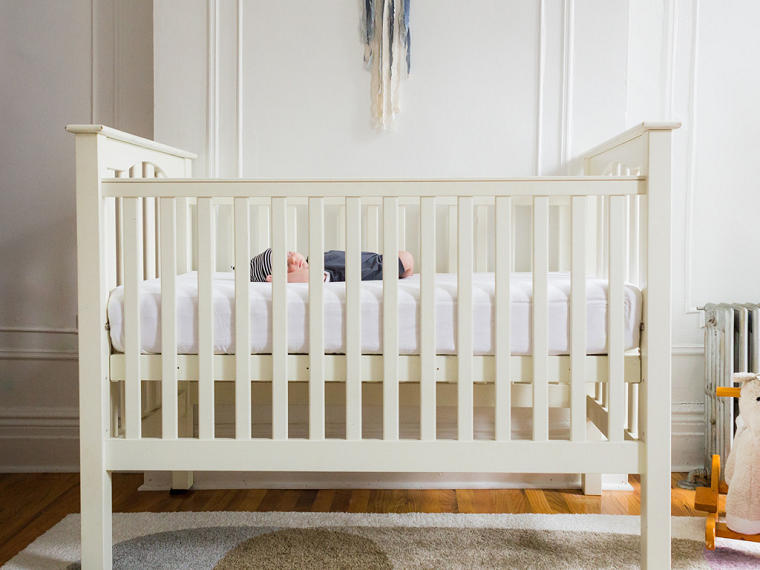
The topic of infant sleep is riddled with half-truths; otherwise, people might stop having children altogether. But let’s stick to the facts: “Babies typically wake up three times a night when they are under a year old.”
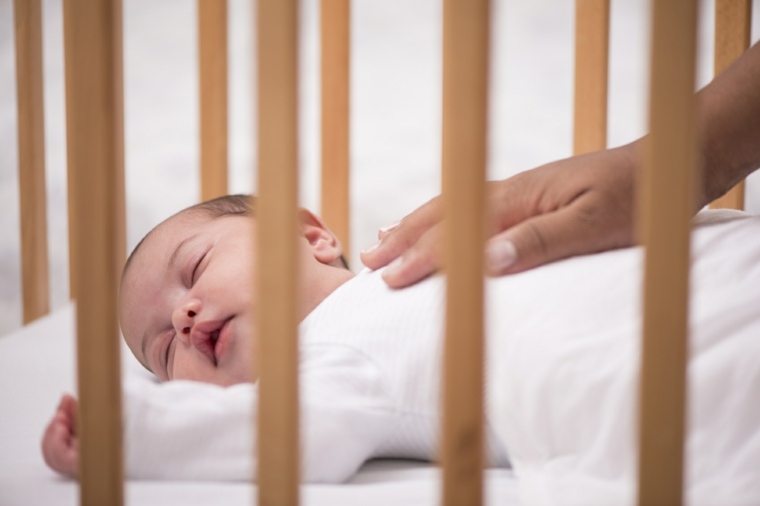
Sleep is one of those things you take for granted until you have to deal with a baby. Babies and sleep can sometimes be strange bedfellows. Today, we will try to debunk the most common myths about baby sleep.
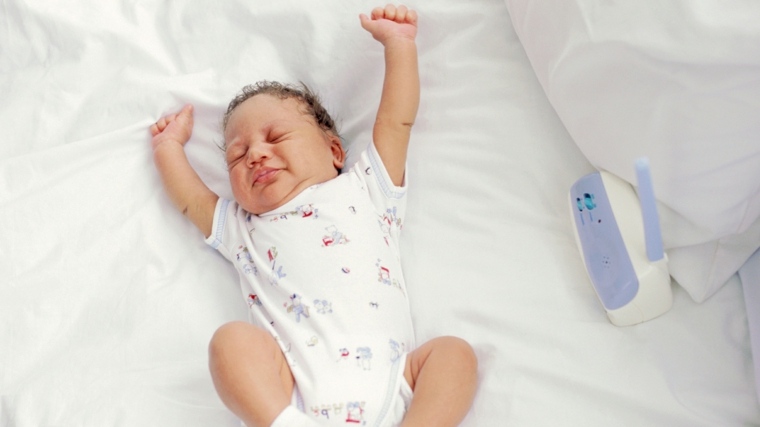
Your baby will sleep through the night
The most confusing term is about your baby sleeping through the night. So here’s the thing: we all wake up throughout the night, sometimes partially and sometimes fully. You don’t sleep through the night, and neither does your baby.

Instead of believing that “sleeping through the night” means your baby sleeps 10-12 hours straight without waking up, let’s redefine it to mean that your baby can sleep through the night. Your baby can transition between sleep cycles without crying and without needing your help to fall back asleep.
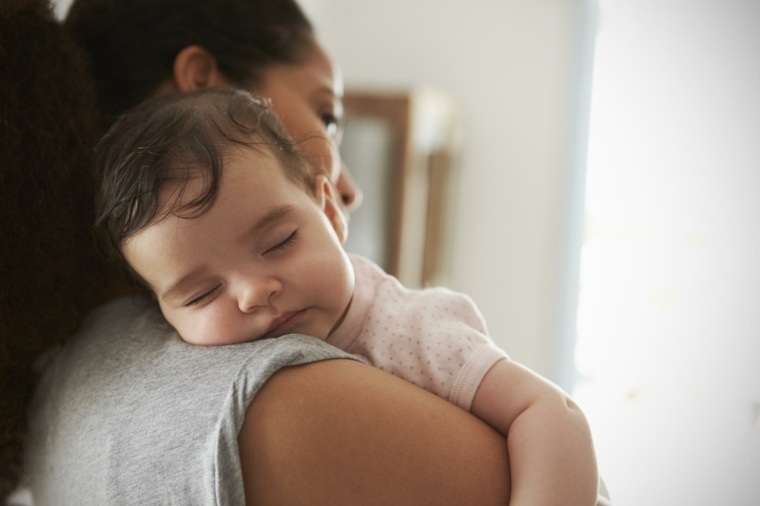
Rethinking this terminology can help alleviate some of the pressure when your baby wakes up throughout the night. If babies can fall asleep on their own, then you can say they sleep through the night.
All babies sleep through the night in the first 3 months
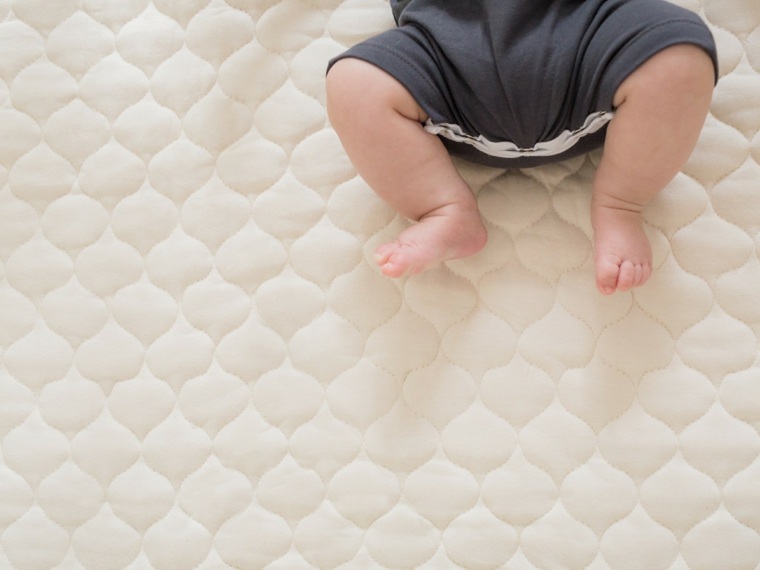
Not true. It’s important to emphasize again that no one (babies or adults) sleeps through the night. We all have brief awakenings during the night and go back to sleep, without remembering them. While some babies are more calm than others and can fall back asleep on their own, most cannot sustain a six to eight-hour sleep period until they are six months old.
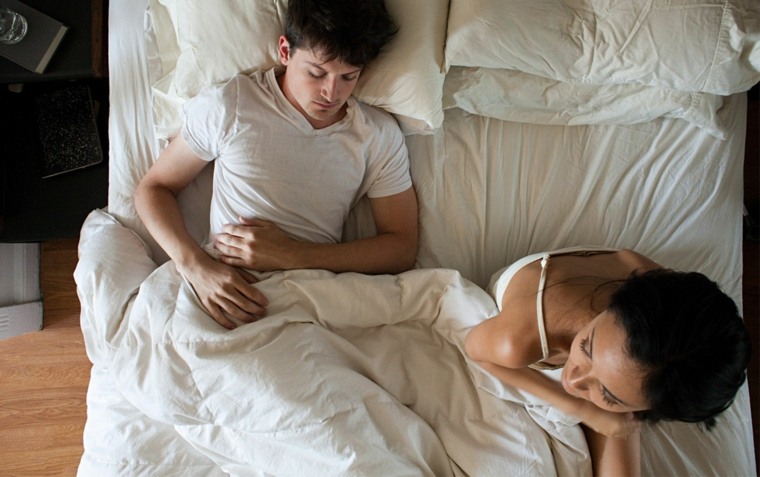
Your baby will adjust to your lifestyle and schedule
This is when all parents laugh out loud. Before having kids, that’s often what we think, right? There’s no way I’m going to be that parent who’s stuck at home because my baby needs to sleep. And in the early months, when you can move around with your baby more easily, that’s a possibility.

Your baby will sleep soundly while you go about your day.
At some point, when parents want to start working on instilling better sleep habits, they must change their active social life and focus more on a consistent sleep routine for their little one.
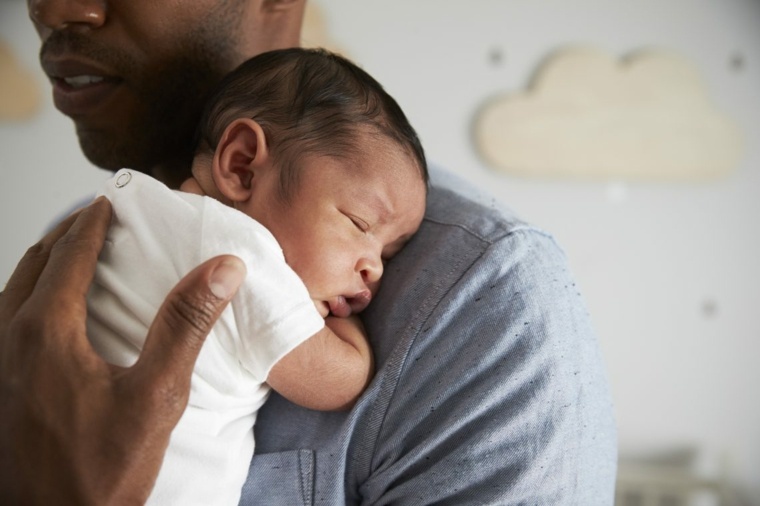
Your baby should have nap and bedtime schedules, and sticking to these routines will be key in their sleep process. Additionally, having a consistent environment will help promote the proper sleep quality that your baby needs.
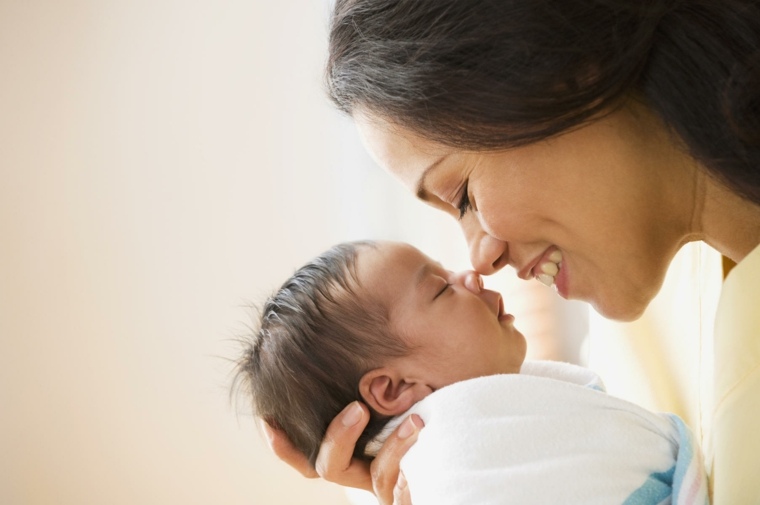
If you don’t let the baby sleep all day, they will sleep all night
Guilty as charged! Many parents are totally guilty and have thought exactly this when they had their first baby. Don’t worry, this is normal and happens to a lot of people. Many parents intentionally don’t let their children fall asleep all day so they can sleep longer stretches throughout the night.

If you’ve done your sleep training homework, you know that most books will tell you that sleep begets sleep, and those books don’t lie. The more rested your baby is during the day and before bedtime, the easier it will be to fall asleep at night and sleep more soundly throughout the night. Focus on better naps and bedtime. That alone can help your baby sleep better at night.

As time goes on, babies start sleeping better
Possibly, but what parents must understand is that while we are all born with the ability to sleep, falling asleep without assistance is a skill that is learned and one that we must give our babies the opportunity to learn.

Starting to incorporate healthy sleep habits from the beginning can save you the headache of trying to teach your toddler or preschooler to sleep better at night. While it’s not impossible to help your child sleep better as they get older, it can definitely be more challenging once they’re in bed, able to move freely, and speak aloud.

Bigger babies sleep better
There is no scientific study comparing the sleep duration of bigger babies to smaller babies. However, bigger babies have larger stomachs and can take in more milk when they feed. This can help them sleep longer periods of time without waking up due to hunger. But we can’t say it’s a universal truth without exceptions.

The baby doesn’t really need that much sleep
Nap struggles and bedtime battles are the two most common issues you’ll hear when parents talk about babies. At some point, parents decide that their baby is the baby who doesn’t need a nap and can stay awake and watch the Late Show with mom and dad.

But that’s not the case, your baby needs much more sleep in a 24-hour period than you do. Your baby needs up to 14-15 hours of sleep per day until the age of 1, and up to 12 hours per day for toddlers. It’s important to provide the amount of sleep your baby needs to promote better cognitive ability, hand-eye coordination, better behavior and mood, and a stronger immune system.
Discover the Truth Behind Baby Sleep Myths
Do you have a baby who just can’t seem to sleep? Don’t worry, you’re not alone. Many parents struggle with getting their little ones to sleep through the night. But before you start believing all the myths and old wives’ tales, let’s uncover the truth behind them.

Some Babies Just Have Trouble Sleeping
It’s true that some babies have very light sleep and can be easily awakened by environmental noise. However, most babies are perfectly fine with their own sleep. It’s actually the parents’ sleep disruption that creates most of the problems.

Teething Isn’t the Cause of Sleep Problems
You’ve probably heard this excuse before – “My baby can’t sleep because of teething.” But here’s the thing, teething shouldn’t affect your child’s sleep or ability to sleep too much. While there may be some discomfort associated with new teeth, it doesn’t mean you have to throw all sleep rules out the window and resort to sleep aids.

If you’ve been dealing with sleep problems for a long time, chances are teething isn’t the issue. It may be time to consider sleep training and work on breaking some of those sleep habits.

Your Baby Can Sleep According to a Plan
While certain medical issues can be a hindrance to sleep training, for the most part, children are 100% capable of falling asleep. If you don’t have a proper plan and lack consistency in sleep training, it may seem like an impossible feat.

That’s why creating the right plan for you and your partner, and having the proper support to stay consistent throughout the process is key. If you want to make changes, you have to make changes. It’s as simple as that.

Once your baby starts sleeping well, they will sleep for 8 hours straight
There is no research to support this claim. There is also no evidence that heavier babies sleep better. You may have heard this myth before – “Once your baby weighs 8 kilos, they’ll sleep through the night!” But the truth is, breastfeeding before bedtime may help smaller babies sleep a little longer. After eight months, they shouldn’t need to eat at night for nutritional reasons.

Breastfeeding Doesn’t Guarantee Better Sleep
No matter what your mother-in-law insists, experts say there is no evidence that breastfeeding helps babies sleep better. If this were true, all breastfed babies would be sleeping through the night within a few weeks of life, and we know that’s not the case.

Babies Wake Up Because They’re Babies
Babies wake up frequently, it’s just a part of their nature. It doesn’t mean there’s something wrong with them or that you’re doing something wrong as a parent. Understanding and accepting this fact can help you navigate the challenges of baby sleep more easily.

Say goodbye to sleepless nights!
By the time your baby reaches 4-6 months old, they no longer need to be fed throughout the night, as long as they are growing well and have no medical issues. If your baby is still waking up for nighttime feedings, it’s because they have developed a habit of relying on it to fall back asleep.

But here’s the thing: once you break that habit, they can learn to sleep without it and adjust to getting those calories during the day instead.

Creating sleep habits doesn’t harm your baby’s psychology
This is the biggest myth of all. Letting your baby learn to fall asleep on their own doesn’t mean they will feel abandoned or unloved. It’s not just about choosing a method; there are other sleep training tools that can be implemented to help your little one sleep better.

We’re also confident that most people reading this are raising their baby in a loving and nurturing home. Every mother feels the pain of having to teach their little one something difficult, especially when it involves hearing them cry.

No matter which method you choose, there will be some tears involved. But we assure you that even if you’re not helping your baby fall asleep, they will wake up feeling your love and attachment, and that’s something that can never be changed.

Sleep when the baby sleeps? Not always!
Many women find it difficult to fall asleep when they don’t know if their little one will wake up crying in five minutes or two hours. Taking a nap or taking turns sleeping when your partner is home can help you feel less tired and anxious. Having your partner feed the baby occasionally can also give you a much-needed break.

Remember, your child needs to learn the skill of independent sleep. This skill is no different from any other skill they will learn throughout their life. Skills are not forgotten, but they do need to be reinforced from time to time, just like riding a bike. At some point, you have to let go, and that can be terrifying!

They may fall and get hurt, but they will also learn how to ride a bike. Then winter comes, the bike gets put away, and the next spring arrives. There may be some initial fear and wobbling when they get back on the bike, but it quickly fades because the skill has already been learned. The same goes for sleeping alone.
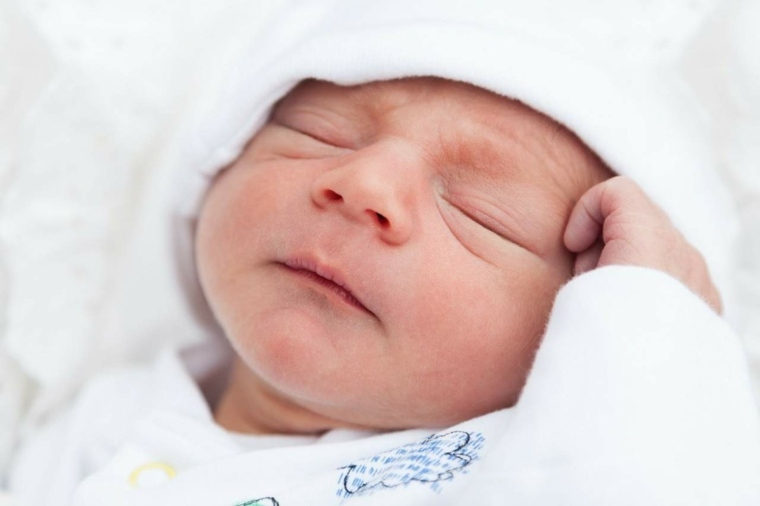
Silence is not always golden when the baby sleeps
Sure, we may need complete silence to fall asleep, but most newborns actually enjoy background noise with a dull or rhythmic sound, as it’s quite noisy inside their mother’s womb. Some babies can sleep while you vacuum, cook dinner, or even watch a movie. It’s comforting and familiar to them.

Are you tired of hearing conflicting advice about your baby’s sleep habits? Let us reveal the truth behind common myths and provide you with practical solutions.

Say goodbye to sleepless nights with these expert tips and ideas for helping your baby sleep better.







